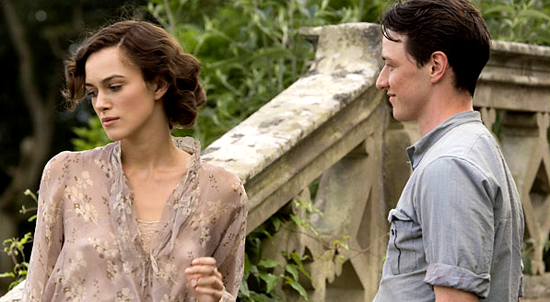

Reviews of Recent Independent, Foreign, & Documentary Films in Theaters and DVD/Home Video
Directed by Joe Wright. Produced by Tim Bevan, Eric Fellner and Paul Webster. Written by Christopher Hampton, from the novel by Ian McEwan. Director of Photography, Seamus McGarvey. Edited by Paul Tothill. Music: Dario Marianelli. Released by Focus Features. UK/USA. 123 min. Rated R. With James McAvoy, Keira Knightley, Saoirse Ronan, Romola Garai, Brenda Blethyn, Juno Temple, Benedict Cumberbatch & Vanessa Redgrave. Global warming evidently came early to 1935 England, judging by the long hot summer in the first half of Atonement. It’s a hot house environment indoors and out, by fountain and lake, at the Tallis country estate. The heat stokes the already fertile imagination of precocious 13-year-old Briony Tallis (Saoirse Ronan). From her bedroom window, she espies her languid older sister, Cecilia (Keira Knightley), cryptically exchange words (and later, more) with the housekeeper’s son, Robbie Turner, played by an atypically subdued James McAvoy. (Knightley, pouting and panting in lovely period costumes, shows it is easy wearing green) Robbie is the dramatic version of the cocky upstart striving for advancement through a posh education that McAvoy played to comic effect in Starter for 10. Although he has been to university with Cecilia, Robbie still works in the garden, hoping to go on to medical school with the continued financial aid of the sisters’ father. The class divisions are viscerally apparent on Robbie’s long jaunt up the rural road in a tuxedo to an evening soiree at the big house (for which his mother spent the day polishing the silver). But the heat has affected his judgment too, as his exuberant error in a letter to Cecilia steams up a series of coincidental calamities exacerbated by Briony’s confused naïveté and jealousy, which will have dire consequences for the entire household. (As one of the dinner guests, Benedict Cumberbatch is having a banner run in supporting roles, from the prime minister in Amazing Grace to McAvoy’s comic foil in Starter for 10, and here he brings an unusual subtlety to what could have been just another lecherous war profiteer and upper-class snob.) In this first act, director Joe Wright capitalizes on the techniques of Alejandro González Iñárritu, such as in 21 Grams, to bring forward different points-of-view of the same event, even through literal rewinds. He resorts to more conventional flashbacks of memories when, four years later, the conscripted Robbie loses most of his regiment in the forests and meadows of northern France, recalling another wartime romantic epic, A Very Long Engagement. By then, Wright has decided that the problems of three little people don’t amount to a hill of beans in this crazy world, as the detritus of this intimate tragedy play out against the evacuation of Dunkirk in 1940. The plot is almost swept away with an astonishing long tracking shot of a huge army in massive retreat. The camera follows the wounded Robbie along the crowded beach, bars, and battalions of men doing whatever is necessary to get home across the channel as quickly as possible – blowing up heavy equipment, shooting horses, and killing time drinking and singing. From his first film, Pride & Prejudice, Wright reunites here not only with Knightley, composer Dario Marianelli, and Brenda Blethyn (in the small role of Robbie’s mother), but also the same talented production and costume designers who create beautiful period images in the best Masterpiece Theater tradition.
The exquisitely beatific cinematography by Seamus McGarvey and the creative sound design triumph over the intrusively syrupy score and
Christopher Hampton’s treacly adaptation of Ian McEwan’s much more cynical novel that was suggestive of Lillian Hellman’s play
The Children’s Hour. Both the exaggeratedly theatrical lighting and the continuing leitmotif of a typewriter, echoed by Jean-Yves Thibaudet’s
reverberating solo piano notes, provides the narrative link from the beginning to the epilog with Vanessa Redgrave as the elderly Briony.
Nora Lee Mandel
|